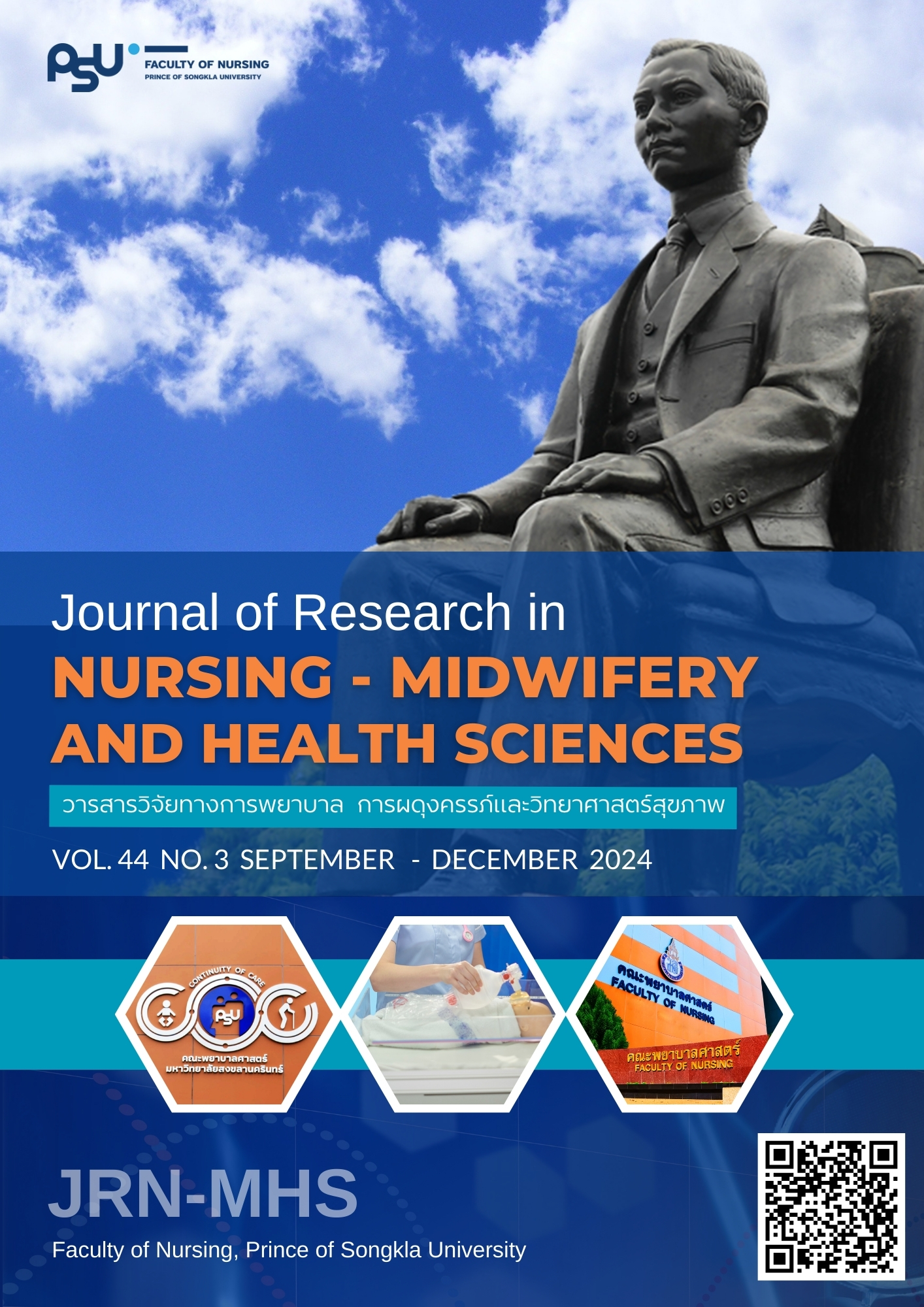ประสิทธิผลการพัฒนากระบวนการส่งเสริมพฤติกรรมสุขภาพที่พึงประสงค์ เพื่อสุขภาพที่ดีของกลุ่มวัยทำงานในสถานประกอบการ เขตสุขภาพที่ 12
Main Article Content
บทคัดย่อ
วัตถุประสงค์: เพื่อศึกษาพฤติกรรมสุขภาพที่พึงประสงค์และภาวะสุขภาพของกลุ่มตัวอย่างก่อนและหลังเข้าร่วมกระบวนการพัฒนาการส่งเสริมพฤติกรรมสุขภาพที่พึงประสงค์และประเมินประสิทธิผลการพัฒนาฯ กลุ่มวัยทำงานในสถานประกอบการ เขตสุขภาพที่ 12 วิธีการ: แบ่งออกเป็น 5 ระยะ ดังนี้ 1) เตรียมความพร้อมกระบวนการพัฒนาแกนนำนักส่งเสริมสุขภาพ 2) พัฒนาแกนนำฯ จำนวน 80 คน 3) สำรวจพฤติกรรมสุขภาพที่พึงประสงค์และภาวะสุขภาพของกลุ่มอาสาสมัคร จำนวน 1,649 คน ในสถานประกอบการ 40 แห่ง ก่อนและหลังเข้าร่วมกระบวนการพัฒนาการส่งเสริมพฤติกรรมสุขภาพ 4) ประเมินประสิทธิผลของกระบวนการพัฒนาการส่งเสริมพฤติกรรมสุขภาพในสถานประกอบการ และ 5) ถอดบทเรียนกระบวนการพัฒนาการส่งเสริมพฤติกรรมสุขภาพและการปรับเปลี่ยนพฤติกรรมสุขภาพของสถานประกอบการที่เข้าร่วมกระบวนการพัฒนา ผลการศึกษา: พบว่าภายหลังการเข้าร่วมกระบวนการส่งเสริมพฤติกรรมสุขภาพ กลุ่มอาสาสมัครมีการปรับเปลี่ยนพฤติกรรมที่ดีขึ้น ได้แก่ รับประทานผักอย่างน้อย 5 ทัพพี/วัน การไม่เติมเครื่องปรุงรสเค็มเพิ่ม รับประทานอาหารมื้อเย็นห่างจากเวลานอนไม่น้อยกว่า 4 ชั่วโมง รับประทานอาหารประเภท ต้ม นึ่ง ลวก อบ ยำ ดื่มเครื่องดื่มรสหวานน้อยกว่า 3 วันต่อสัปดาห์ แปรงฟันก่อนนอนอย่างน้อย 2 นาที การไปรับบริการทันตกรรม ไม่สูบบุหรี่ อย่างมีนัยสำคัญทางสถิติที่ระดับ .05 ผลภาวะสุขภาพ พบว่า ค่าความดันโลหิตตัวล่างและค่าน้ำตาลในเลือดหลังการทดลองดีขึ้นอย่างมีนัยสำคัญทางสถิติที่ระดับ .05 การประเมินประสิทธิผลของกระบวนการพัฒนาการส่งเสริมพฤติกรรมสุขภาพ 4 ด้าน ได้แก่ ด้านบริบท ด้านปัจจัยนำเข้า ด้านกระบวนการ และด้านผลการดำเนินงาน ในภาพรวมระดับมาก (M = 4.09, SD = .78) สรุป: กระบวนการที่พัฒนาขึ้นสามารถนำไปใช้ขับเคลื่อนการส่งเสริมสุขภาพในสถานประกอบการได้ โดยมีแกนนำนักส่งเสริมสุขภาพเป็นกลไกสำคัญในการดำเนินงานและหน่วยงานภาคีเครือข่ายที่เกี่ยวข้องให้การสนับสนุน
Article Details

อนุญาตภายใต้เงื่อนไข Creative Commons Attribution-NonCommercial-NoDerivatives 4.0 International License.
เอกสารอ้างอิง
National Statistical Office. The labor force survey whole kingdom quarter 4: October-December 2021. Bangkok: National Statistical Office; 2022. Thai.
Department of Industrial Works. Company’s Wellness Center [Internet]. 2022 [cited 2022 Feb 10]. Available from: https://www.diw.go.th/webdiw/wp-content/uploads/2022/02/wellness-1.pdf
Department of Disease Control, Ministry of Public Health, Bureau of Noncommunicable Diseases. Annual report 2016. 1 st ed. Bangkok: War Veterans Organization under The Royal Patronage; 2016. Thai.
Ministry of Public Health. Group reporting system, standard reporting, nutrition work HDC Tethered PHR [Internet]. Nonthaburi: Ministry of Public Health; 2021 [cited 2021 Sep 11]. Available from: https://hdcservice.moph.go.th/hdc/reports/page.php?cat_id=46522b5d1e06d24a5bd81917257a93c
Public Health Dental Office. Data from a survey of desired health behaviors of working age people. To prepare for entering the elderly with quality. Bangkok: Department of Health; 2022. Thai.
National Statistical Office. Industrial census 2017. Bangkok: National Statistical Office, Ministry of Digital Economy and Society; 2017. Thai.
Bureau of Health Promotion, Department of Health, Ministry of Public Health. Guidelines for promoting health and environment in the workplace. Bangkok: Agricultural Cooperatives Association of Thailand; 2019. Thai.
Srisa-at B. Basic research. 10 th ed. Bangkok: Suviriyasan; 2013. Thai.
Inthawong C, Khamkaew K, Rianpoomkarnkit S, et al. Health promotion and disease prevention of employees in medium and small enterprises Rayong Province. TMJ. 2013; 13(3): 340-51. Thai.
Prochaska JO, Diclemente CC. The trans-theoretical model of health behavior change. AJHP. 1997; 12(1): 38-48. doi: 10.4278/0890-1171-12.1.38.
Department of Health 4.0 Project Office, Department of Health, Ministry of Public Health. Concepts and principles of a health literacy organization [Internet]. 2018 [cited 2021 Nov 16] Available from: https://mwi.anamai.moph.go.th/web-upload/migrated/files/mwin1139_a5a9caa9ec03f3d810c1f83cb7da874earticle_20180924133139.pdf
Health Education Division, Department of Health Service Support Ministry of Public Health. Changing health behavior by the community [Internet]. Nonthaburi: Health Education Division, Department of Health Service Support Ministry of Public Health; 2021 [cited 2022 Sep 13]; Available from: https://hp.anamai.moph.go.th/web-upload/4xceb3b571ddb70741ad132d75876bc41d/tinymce/OPDC/OPDC2564-S/IDC1_19/OPDC_2564_IDC1-19_01.pdf
Sukmak P. Principles of health promotion [Internet]. Songkla: Southern Health System Management Institute, Prince of Songkla University; 2021 [cited 2021 Nov 16] Available from: https://localfund.happynetwork.org/upload/forum/manual_Health_pen.pdf
Edwards M, Wood F, Davies M. The development of health literacy in patients with a long-term health condition: The health literacy pathway model. BMC public health. 2012; 12(130): 1-15. doi: 10.1186/1471-2458-12-130.
Inthakamhaeng A. Health literacy: Measurement and development. Bangkok: Behavioral Science Research Institute, Srinakharinwirot University; 2017. Thai.
Office of Risk Communication and Health Behavior Development, Department of Disease Control, Ministry of Public Health. Guide to the process of creating health literacy in preventing and controlling disease and health hazards [Internet]. 2021 [cited 2022 Mar 10]; Available from: https://ddc.moph.go.th/uploads/publish/1188920211018040126.pdf
Kaewdamkeng K. Health literacy: Basics, Interaction, judgment. 1 st ed. Bangkok: Amarin; 2019. Thai.
Matsee C, Wanaratwijit C. Promoting health literacy: From concept to practice. BCNUT J Nurs. 2017; 9(2): 96-111. Thai.
Inthakamhaeng A. Development and use of tools for Thai adults to assess in compliance with the 3A. 2S principles. Health Education division, Department of health service support, Ministry of Public Health; 2014. Thai.
Srisathitnarakun B. Health service system management strategies in the ASEAN Economic Community era. Pathum Thani: Thammasat University Printing House; 2017. Thai.
Physical Activity Division for Health, Department of Health. Review report Impact of the COVID-19 outbreak towards physical activity. Division of Noncommunicable Diseases, Department of Disease Control; 2021. Thai.
Pratumthon w, Janjob P, Rasiri S, et al. Development of a participatory health promotion model for health promotion behavior and health status of Boromarajonani College of Nursing personnel. SCNJ. 2019; (28): 96-108. Thai.
Janjob P, Pratumthon W, Rasiri S, et al. Evaluation of health promotion in workplaces in driving the community health system to the district health system nursing network, Eastern region, Thailand. JHNR. 2019; 35(3): 86-97. Thai.
Ketmai W, Suesat T, A study of employee health promotion in 3 the workplaces. HEALTH. 2023; 46(1): 116-28. Thai.
Panyowat D. Training strategies that affect the work efficiency of operational employees at the bank for agriculture and agricultural cooperatives. RERU. 2019; 13(3): 55-67. Thai.
Meekruearod W. Effects of health promotion programs on health behavior Body mass index and blood pressure of public health personnel in Kirimat District Sukhothai Province. PPHJ. 2020; 1(1): 70-85. Thai.


